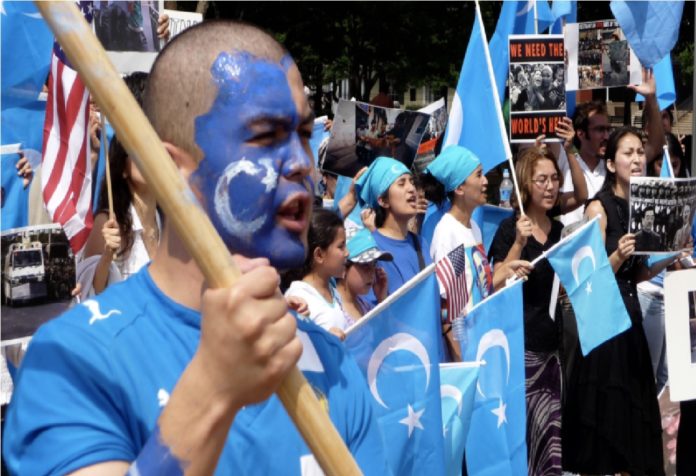(Column by Nuri Musabay, an Uyghur human rights activist who is currently based in the US)
The Uyghurs are one of the most loyal, the most devout and the most supportive Muslims in the world. Although they have been under colonial rule for decades, they have never given up on their Islamic faith as a main pillar of their spiritual life. They have paid a heavy price, in particular, for their steadfast commitment to their religion in a fiercely atheistic, suppressive and communist state—China.
In the meanwhile, they have never failed to support the freedom and liberty of Muslims in other parts of the world in various ways. For example, they did their best to support the struggles of Muslims during the late Ottoman period and the struggles of the post-Ottoman Muslims in the Middle East against the colonialists. They went to help them as volunteers where possible; if that was not possible, they never forgot to pray for them in their mosques in the spirit of Muslim brotherhood. Especially for more than 70 years, the Uyghurs have always been on the side of Palestinians, being supportive of their cause. Unfortunately, since 2017, when the Uyghurs have been subject to genocide in their ancestral homeland, East Turkistan, including their faith being eliminated altogether, they are abandoned by the Muslim world altogether. For example, Palestinian Authority President Mahmoud Abbas has recently voiced his support for what he described as China’s “legitimate position on Hong Kong, Xinjiang and other matters concerning China’s core interests.”
Not only the Palestinian Authority, but also governments of 25 other Islamic countries, including Pakistan, Saudi Arabia, Egypt, and the United Arab Emirates, supported China’s persecution of the Uyghurs in China, openly stating that China’s policy towards the Uyghurs is correct and even praiseworthy. On the contrary, the traditionally Christian countries are sympathetic to the Uyghurs from a humanitarian perspective. And recently, the Dutch and Canadian Parliaments have recognized the Uyghur genocide, calling for China to be held accountable for its crimes against humanity.
The most ironic part of the Muslim world’s reaction to the Uyghur genocide is that the Iranian theocratic regime, which is always boastful for its adherence to the Sharia Law, and which issued a worldwide order to assassinate the Indian writer Salman Rushdie, for his book “The Satanic Verses” in the name of defending the dignity of the Qur’an is precisely silent over the burning of the same holy Qur’an by Chinese authorities in East Turkistan. This reveals that the Islamic faith for them is not a matter of a spiritual principle and guidance but of an ideological tool for their grip of political power.
The reaction of the Muslim world to the Uyghur genocide needs a deeper analysis here. For more than 70 years, the Chinese government has mostly been on the Palestinian side in a guileful manner, pretending to be the defender of justice. In particular, the ongoing tension between Israel and Palestinian authorities has offered China a crucial opportunity to portray itself as pro-Islamic and the West as anti-Islamic.
During this time, many wars, civil wars, and conflicts happened in the Middle East, in Muslim countries, such as Iraq, Syria, Lebanon, Libya and among others, some of which were orchestrated by some Western countries. Amid this turmoil, the US has shown its firm and constant support of Israel at all costs. This has created a growing sense of anti-Westernism among some Muslims, Muslim governments, and institutions, which culminated in the creation of the Al Qaeda and other terrorist organizations, successfully mobilizing hardline and conservative Muslims against the West and the Islamic “puppets” of the West.
Notably, the destruction of Iraq, in particular, because of the invasion by the coalition forces under the pretext of eliminating the Weapons of Mass Destruction, intensified the anti-US and anti-West sentiments among Muslims in the Middle East. This destruction is still ongoing, leaving Iraq a deeply shattered country without being able to return to its previous prosperity and security. Ironically, the political slogan used by both the then US President Bush and the then UK Prime Minister Blair that the West would bring democracy to Iraq brought about, instead, a sustained status of anarchy as the power vacuum, which was rapidly filled in by the Islamic State, posing a formidable threat to the security of the whole Middle East and beyond.
This created a great opportunity for radical Islamic factions to increase its influence among Muslims by fanning out the anti-Western sentiments. These sentiments made the Muslim world to look up for an alternative super-power. And it was China to take on this role, given the fact that China has diplomatically and economically increased its influence in the Islamic world in reverse proportion to that of the West. In addition to this, the One Road Initiative, in which most of the Muslim countries participated, was another incentive for the Muslim world to be wooed by China. In the meanwhile, the fast development of the Chinese economy has enabled it to buy the loyalty of the Muslim leaders in the corrupt and dictatorial Islamic countries through bribery—most importantly, through debt-trap diplomacy.
As such, the Uyghur genocide has not been well publicized in the Muslim world, thanks to the already cemented deep economic ties between the Muslim world and China. Therefore, it is not surprising that the Muslim world, which condemned the critique of the French President Macron who said that Islam is in a crisis, did not say anything when the Chinese government said that Islam is an ideological virus. Therefore, even today China is committing genocide against the Uyghurs, burning the Qurans, destroying Islamic heritage, trampling on Islamic beliefs, and insulting Uyghur Muslim women and girls, the Muslim world is keeping silent as if it has known nothing. The reality is that when it comes to condemning a country weaker than China for its alleged anti-Islamic speech or behavior, the Muslim world is so energized to unleash its hatred towards it, while constantly being silent over the systematic and well-documented anti-Islamic practices of China.
How could the Chinese Government carry out the genocide against the Uyghurs without fear of the international community, in particular of the worldwide Islamic community? It is partly due to the rise and intensification of Islamophobia in the West. When the West launched the war on Islamic terrorism, they did not clarify the definition of terrorism at the outset and not even in the process of its implementation. This unclarity provided a golden opportunity for China to hijack this term to brush any form of Uyghur resistance against China’s persecution, which has mostly been peaceful, with terrorism. As such, China maximized the effect of its diplomacy and of its global propaganda with this term to portray itself as a victim of Uyghur terrorism as part of global terrorist networks. Furthermore, it has asked the West not to use a double standard for its efforts to fight against Uyghur terrorism. To dance the music of China, the administration of George W Bush in 2004 added the East Turkestan Islamic Movement (ETIM), also sometimes called the Turkestan Islamic Party, to a blacklist as the tacit support of China at the height of the US-led war on terror. Although ETIM was delisted by the US government in 2020 prior to the end of the Trump administration, China had had an enough time to use this designation as one of the key justifications for its current Uyghur genocide.
The war on terror that the US-led West waged against Islamist terrorists all over the world did not go well; instead, it caused the death of many innocent civilians in the Muslim world. This made Muslims question and doubt its original goal and benefits. The United Nations showed, on the other hand, its incompetence to take leadership in the fight against terrorism with a clear definition, realistic goal, and justifiable means. The Bush and Obama administrations did almost nothing for the abuse of the term “war on terror” by authoritarian and non-democratic regimes, e.g., China, Iran, Syria, and Turkey, to suppress their domestic voices of freedom. The subsequent Trump administration’s Muslim ban and open remarks against Muslims drove the Muslim world further away from the West ideologically while bringing them closer to China politically and economically.
The recent humanitarian crises that Muslims have been going through, including the Rohingya genocide in Myanmar and the serious human rights violations in Yemen, Libya and Syria, met with the silence of the world. All these events gave political and diplomatic encouragement to China seize the opportunity to carry out its own genocide against Uyghur Muslims, after it is reassured that any criticism from the international community against its genocidal behavior face weak condemnation.
On the other hand, according to John Bolton, a former White House adviser, stated in his autobiography called “The room where it happened” that during the President Trump’s meeting with Xi Jinping, Trump spoke positively of the Chinese government’s decision to build large-scale detainment camps for Islamic extremists—for the Uyghurs. With that single word “yes”, Trump backed up the Chinese government’s Uyghur genocide politically, for which the Trump administration should take some responsibility.
Since Michael Pompeo became the U.S. Secretary of State in 2018, the U.S sympathy for the Uyghurs has improved significantly. After the US elections last year, the Biden administration has been trying to form a trans-Atlantic alliance to contain China aggressivity. But this administration is still hesitant to call the Uyghur crisis genocide firmly, constantly and adequately and formulate a more urgent, coherent, and effective policy to stop it.
If this time the world continues to keep its silence over the Uyghur genocide, the Chinese government will be more emboldened to complete the Uyghur genocide further and become a more menacing superpower for the world in future.
(Disclaimer: Views expressed in the article are of the author)








